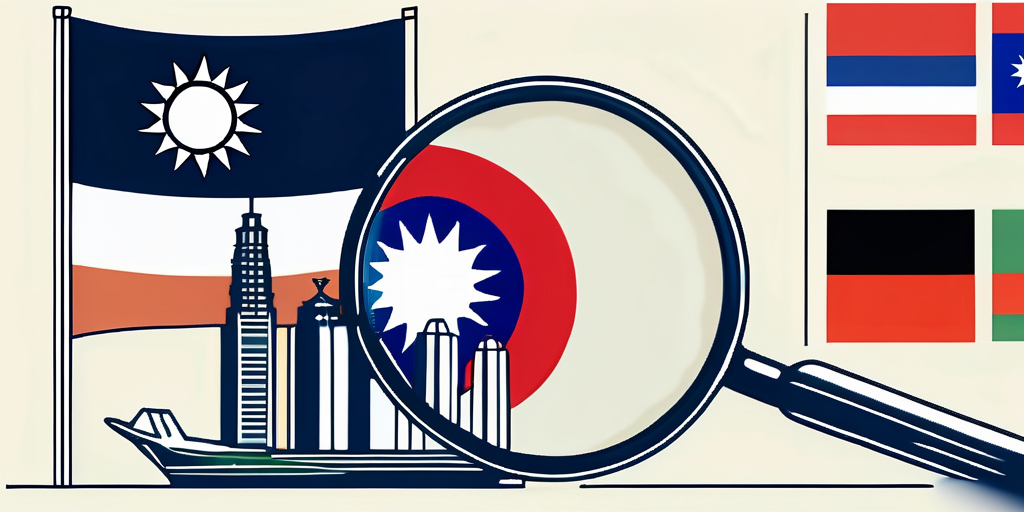Taiwan’s Interpol Red Notice Alert has generated significant attention and controversy in recent months. The issuance of a Red Notice against a Taiwanese national by Interpol represents the latest chapter in the ongoing saga of Taiwan’s relationship with this global law enforcement organization. In this article, we will delve into the complexities of the Interpol Red Notice and its implications for Taiwan’s international status and human rights concerns.
Understanding the Interpol Red Notice
Before we explore Taiwan’s specific situation, it is crucial to grasp the fundamental concept of the Interpol Red Notice and its purpose. A Red Notice is essentially an international arrest warrant issued by Interpol to seek the location and detention of an individual wanted by a member country for prosecution or extradition.

Definition and Purpose of Red Notice
The Red Notice serves as a tool to enhance international cooperation between law enforcement agencies and facilitate the apprehension of fugitives across borders. It is not an arrest warrant itself, but rather a request for the arrest of a person wanted by judicial authorities in another country.
When a member country issues a Red Notice, it provides detailed information about the wanted individual, including their identity, physical description, and the crimes they are accused of. This information is then circulated to all other member countries, enabling them to be on the lookout for the suspect and take appropriate action if they are located within their jurisdiction.
Furthermore, the Red Notice system allows for the exchange of intelligence and investigative leads between member countries, enabling them to work together in solving complex transnational criminal cases. This collaborative approach helps bridge the gaps in jurisdictional boundaries and ensures that criminals cannot find safe havens in different parts of the world.
The Global Impact of Red Notice
Interpol’s Red Notice system plays a significant role in combating transnational crimes such as terrorism, organized crime, and drug trafficking. It acts as a means of alerting member countries to the presence of a wanted individual and requesting their assistance in locating and apprehending the suspect.
By providing a standardized and widely recognized mechanism for sharing information about wanted individuals, the Red Notice system has proven to be an invaluable tool in the fight against international crime. It enables law enforcement agencies to coordinate their efforts, share intelligence, and work together towards a common goal of apprehending fugitives and bringing them to justice.
Moreover, the Red Notice system serves as a deterrent to potential criminals, as they know that their actions will not go unnoticed or unpunished. The fear of being flagged by Interpol and having their movements restricted can act as a powerful deterrent, discouraging individuals from engaging in criminal activities that have far-reaching consequences.
Additionally, the Red Notice system has been instrumental in facilitating the extradition of wanted individuals, ensuring that they face trial in the country where the crimes were committed. This helps in upholding the principles of justice and ensuring that victims and their families receive closure and the perpetrators are held accountable for their actions.
In conclusion, the Interpol Red Notice system plays a vital role in international law enforcement efforts. It serves as a powerful tool for member countries to collaborate, share information, and apprehend fugitives across borders. By understanding the concept and purpose of the Red Notice, we can appreciate its significance in combating transnational crimes and ensuring global security.
Taiwan’s Relationship with Interpol
Taiwan’s involvement with Interpol has been a subject of contention due to its unique political status. Despite being a sovereign territory with its own government and legal system, Taiwan is not recognized as a separate country by the United Nations and most international organizations.

Historical Overview of Taiwan-Interpol Relations
In the early years, Taiwan had limited involvement with Interpol due to its exclusion as a member state. However, in recent decades, Taiwan has made efforts to participate in various Interpol initiatives and enhance cooperation with member countries in combating global crime.
Current Status of Taiwan’s Interpol Membership
Taiwan’s attempts to join Interpol as a member state have been repeatedly rejected due to political pressure from China, which claims sovereignty over Taiwan. As a result, Taiwan has been excluded from accessing Interpol’s secure communications network and databases, severely hindering its ability to contribute to international law enforcement efforts.
The Controversy Surrounding Taiwan’s Red Notice Alert
The issuance of a Red Notice against a Taiwanese individual has sparked controversy for several reasons, primarily related to the implications it carries for Taiwan’s international recognition and human rights concerns.
Political Implications of the Red Notice
Many argue that the Red Notice against a Taiwanese national compromises Taiwan’s sovereignty and reinforces the narrative propagated by China that Taiwan is not a separate country but a renegade province. This politicization of Interpol’s processes undermines the organization’s credibility and impartiality.
Human Rights Concerns
Given China’s influence within Interpol, there are concerns about the fair treatment of Taiwanese individuals subject to Red Notices. China’s human rights record and the lack of transparency regarding its use of the Red Notice system raise questions about the potential for abuse and politically motivated prosecutions.
Taiwan’s Response to the Red Notice Alert
Taiwan’s government has responded to the Red Notice alert by emphasizing its commitment to international law and human rights. The official statement expressed disappointment over Interpol’s decision and called for a fair and transparent process that respects Taiwan’s sovereignty and protects the rights of its citizens.
Government’s Official Statement
The Taiwanese government declared that the Red Notice undoubtedly undermines the credibility and effectiveness of Interpol’s mechanisms. It urged Interpol to reconsider its decision and invite Taiwan to participate fully in the organization, as Taiwan’s exclusion only serves to hinder global law enforcement efforts.
Public Reaction in Taiwan
The Red Notice alert has sparked widespread public concern in Taiwan, with many expressing fears of increased political persecution and mainland China’s expanding influence over international organizations. Civil society organizations are actively advocating for Taiwan’s inclusion in Interpol to protect human rights and safeguard Taiwan’s interests on the global stage.
The Future of Taiwan’s Interpol Involvement
The Red Notice alert against Taiwan reinforces the urgent need to reconsider Taiwan’s status within Interpol and its involvement in global law enforcement efforts. This incident could potentially lead to significant changes in Taiwan’s relationship with Interpol and its international standing.

Potential Changes in Taiwan’s Interpol Status
Taiwan’s exclusion from Interpol has proven to be a strategic disadvantage in tackling transnational crimes originating from or crossing through Taiwan. The situation has prompted renewed efforts within Taiwan to seek alternative avenues for enhancing international law enforcement cooperation.
Impact on Taiwan’s International Relations
The Red Notice alert has both immediate and long-term repercussions for Taiwan’s international relations. As governments and civil society actors closely examine Interpol’s decision, Taiwan’s case highlights the importance of upholding fundamental principles such as sovereignty, human rights, and fair treatment in international organizations.
In conclusion, Taiwan’s Interpol Red Notice Alert serves as a stark reminder of the complexities and challenges faced by Taiwan in the international arena. As Taiwan continues to navigate its way through the intricacies of global law enforcement cooperation, it remains resolute in its commitment to upholding justice, human rights, and its status as a responsible member of the international community.
